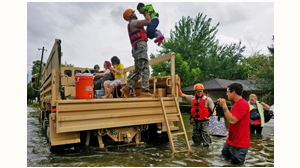Scripture:
1 Thessalonians 4:9-11
Matthew 25:14-30
Reflection:
Many thoughts come in rapid sequence through my consciousness as I sit here in Austin, Texas, at the end of the week of disaster and heroic rescue efforts just down the highway in gulf-coast Texas.
Our first reading is addressed to the Christian community in Thessaloniki, the capital city of Macedonia. The citizens, both Jewish and Christian, had given considerable grief to Paul on his preaching campaign there, but later word comes to him that the community has begun to pull-together, to recognize their indebtedness to the Gospel, and to their own fraternity. Paul singles out their charity for one another, indeed, throughout Macedonia. He makes clear that it is their duty to carry out their charity with their own hands.
The floods in eastern and southeastern Texas are being called a natural disaster, but the heroism of many who have come out to confront the disaster is more than natural, it is supernatural. It is an expression of a fundamental creed that often lies beneath the surface of our political and economic battles, it is the creed that Paul the Apostle refers to in our first reading, and the creed that Jesus exemplifies so clearly and deliberately when, after washing the feet of the disciples, he asks them, “Do you know what I have done?” He has given them an example (Jn 13:14-15), it is the example we profess in the Gospel’s alleluia verse: I give you a new commandment: love one another as I have loved you (Jn 13:34).
The reading from the gospel for today might also offer us a reflection on the week’s flooding and the circumstances surrounding the effects of hurricane Harvey.
Until this week, this gospel parable might have seemed a simple fable about prudent risk-taking versus fear to risk at all. Two servants put their talents to work and multiplied them; one servant feared losing the talent he was entrusted with, and buried it.
The biblical message we usually associate with this parable is that Christians must trade on their true treasure, the Gospel message of salvation through conversion to Christ. That message needs to be a part of our daily activities, our daily witness and testimony to Christ. When proclaimed in this way, it is multiplied in the persons who come to believe in Jesus as Savior.
If, on the other hand, we “hoard” our faith, keeping it out of the daily affairs of our life, we render it sterile and fruitless; it is the talent buried in the ground out of fear.
The flooding following on hurricane Harvey’s passage through the gulf coast has challenged many persons and communities to do “the neighborly thing,” i.e., to love one’s neighbor. These talents of love and compassion for one’s neighbor are being multiplied many times over, and will enrich our communities for generations to come.
One closing thought, out of reverence for our earth and the stewardship we owe it. I cringe when I hear this episode of hurricane Harvey’s landfall called a “natural disaster.” It implies that “nature” is to blame for the calamitous flooding. This kind of consequence to a natural event (a hurricane) is a human disaster, brought about by many human decisions, not by nature. Where to build, what to build, what to pave, how much groundwater to extract, where people choose to live and where to play: these all are questions that human beings interject into the stream of natural forces that we cannot control.
May we learn the many lessons that challenge us from the word of God, and from God’s great gift to us in our habitat we call Mother Earth.
Fr. Arthur Carrillo, C.P. is the director of the Missions for Holy Cross Province. He lives in Chicago, Illinois.
